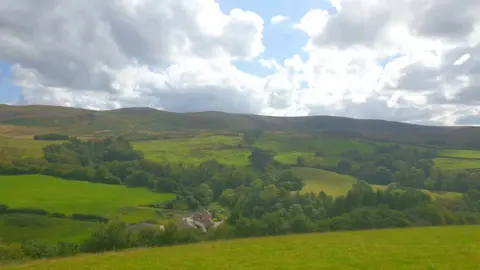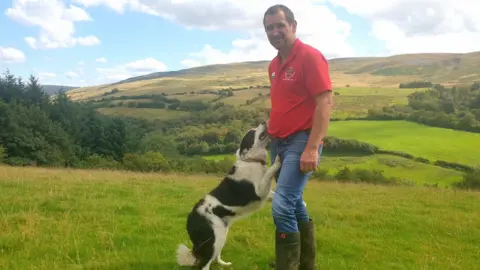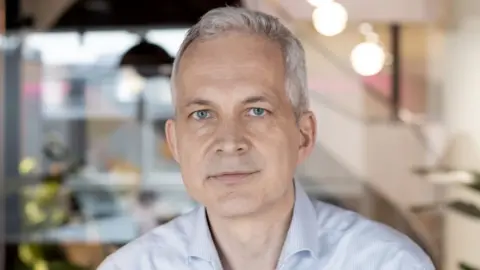Electricity: Lack of capacity 'holds back green energy'
 BBC
BBCFarmers and energy experts say a lack of capacity in the electricity network is preventing some renewable energy projects from seeing the light of day.
NFU Cymru said more Welsh farmers and landowners want to produce clean energy to help reach net zero targets - which means not adding to the amount of greenhouse gases in the atmosphere.
The farming union's president spoke of "huge potential untapped in Wales."
An energy expert said the problem was "pretty significant".
Energy regulator Ofgem said a priority was "reaching net zero at the lowest cost to consumers and in both a sustainable and efficient way".
It added: "We are consulting on proposals to alter existing price controls to empower transmission network companies."
For many in the agricultural industry, tackling spiralling costs is a constant challenge, but producing renewable energy brings opportunity, not only to deal with those costs, but also to ensure that agriculture reduces its carbon emissions.
Garry Williams, a sheep and beef farmer on the edge of the Brecon Beacons National Park, said: "We've got 3.9kw of solar panels on site at the moment. We're looking at the possibility of expanding the renewable energy production as a form of diversification.

"But we've got a major problem, and the problem is there isn't the capacity in the National Grid to take the electric produced down the line."
According to NFU Cymru's president, Aled Jones, the lack of capacity on the electricity network is a major barrier for farmers wanting to produce clean energy.
He said: "A lot of members who've been trying to get into diversification projects and renewable energy have found themselves unable to get grid connection because the availability in the grid was insufficient.
'A real, real issue'
"Another issue was getting three phase connection. The cost in some of these rural areas has been prohibitive for some of these projects.
"It's a real, real issue and we've highlighted several times before and government should've known this by now."
He continued: "We are facing a climate emergency, and farmers are wanting to get on and diversify into other projects.
"At NFU Cymru we've set an ambition to be net zero by 2040, and we've said there are ways of doing it, but other people have got to work with us.
"If government and the availability of grid capacity is not there, it stifles innovation and investment as well. This is serious, there a huge potential, untapped in Wales with renewable projects wanting to proceed but unable to get on."
There are worries that the lack of investment in infrastructure could have an impact on larger scale energy projects in Wales.
Plans are in place to generate electricity through floating wind farms off the coast of south west Wales. But lack of infrastructure means there are questions about how this project would be connected to the electricity network.

"It is a concern, because we've got such a good opportunity in terms of off-shore wind, that if that opportunity goes elsewhere we in Pembrokeshire really do miss out," said Samuel Kurtz, the Member of the Senedd (MS) for Carmarthen West and South Pembrokeshire.
"I have got fears that people may be looking elsewhere to take on-shore the cables that would be carrying the electricity.
'Classic chicken and egg problem'
"But I think that Pembrokeshire lends itself so well to the opportunity that presents itself, and I really do hope that all the stakeholders get together to make sure we take up this opportunity."
Duncan Sinclair, who specialises in energy networks for consultancy firm Baringa, said the issues the grid faced was due to a change in the way it works.
"Electricity networks have been designed based on the old paradigm.
"It's a classic chicken and egg problem in many ways. Generators want to connect to the system, but network operators won't take that step unless they can see enough people needing that capacity.
"So you get into this problem where they're waiting for more requests, but people are reluctant to have to wait and join a queue to connect to the grid."
He added: "In the old days we had big power stations connected to the transmission system, power flowing through the transmissions system to the distribution network and to the end consumer. That's the way it worked for a number of years.
'Long term plan'
"Now things are changing fundamentally, with a lot more smaller assets connecting to the distribution networks.
"So small scale renewables, solar, wind farms, and those might be rooftop solar panels on people's houses or projects on agricultural land."
"The issue there is that now we're putting electricity into the grid from the edges, and the problem comes if there's too much electricity being pumped into the distribution network, and it isn't used locally then it has to flow up the grid. If there isn't enough capacity on the grid then there's a problem because it can't reach customers further away."
National Grid ESO, which operates the electricity system in Wales, England and Scotland, said it was "working closely with distribution network operators, transmission owners, customers and the Welsh government to support the development of a long term plan for the electricity networks in Wales, to resolve any existing issues with connections and to support delivery against shared ambitions for net zero."
Plaid Cymru's climate change spokeswoman Delyth Jewell said: "This is yet another example of the dysfunctionality of an overcentralised UK, where the Welsh government is being hampered in its efforts to realise its renewable energy ambitions by not having control over decisions in terms of how the Welsh share of tax money which contributes to the National Grid is spent."
She added farmers were being told to contribute towards Wales' climate change targets and want to do this by producing renewable energy, but were prevented from doing so because of a lack of grid capacity.
"The system should be changed so that a statutory obligation is placed on the National Grid to deliver the grid capacity the Welsh government requires in order to deliver its policy objectives and support the agricultural, industrial and renewable energy industries," she added.
A Welsh government spokesperson said it recognised the urgent need to increase grid capacity to help Wales reach net zero by 2050 and has repeatedly raised concerns with Ofgem and National Grid ESO.
It said it was working with energy experts "to trigger grid investment to meet Wales's future needs for low carbon heat and transport," and expected this to be considered by National Grid ESO.
It added: "Investment is needed so we can better connect new demands for renewable energy and the new generation to meet the needs across Wales."
